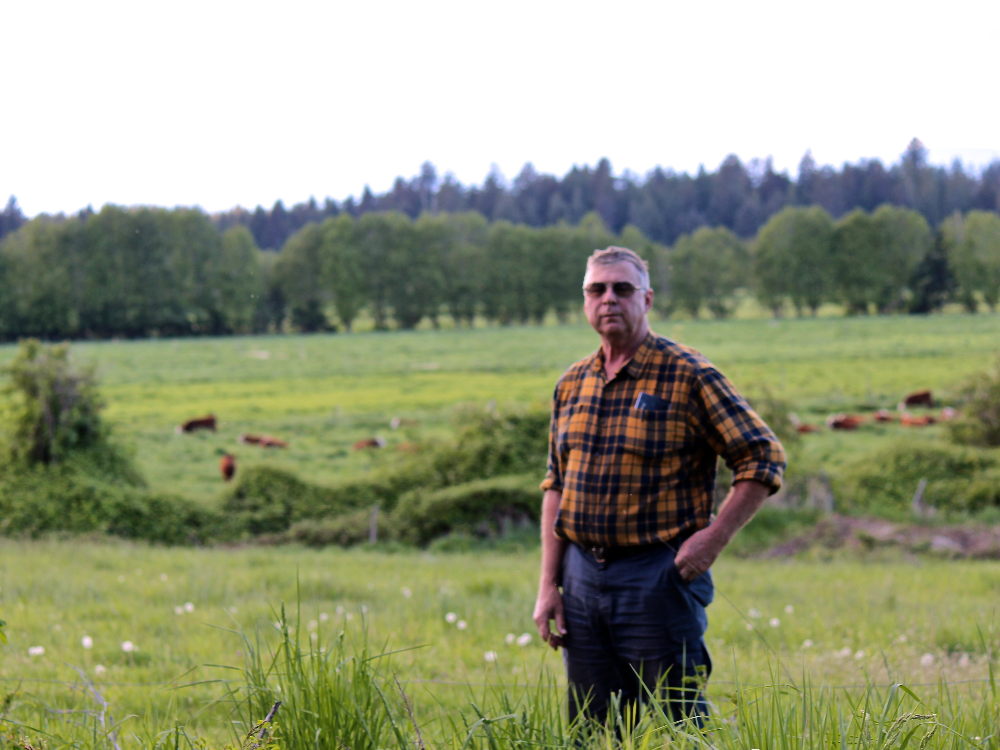On a sprawling 600 acres in Vancouver Island’s Comox Valley live the families of Edgar Smith and his two brothers, Phil and Doug. Verdant pasturelands carpet Beaver Meadows, the third-generation, certified-organic ranch where 300 red angus cattle graze and millions of coho salmon spawn.
Smith, who has managed the farm’s day-to-day operations since 1980, is a steward of his land, having found a way decades ago to marry the needs of the ranch with the needs of the salmon, which he reminded me is “god around here.”
Smith has greying hair and a tall, wide frame, and only admits to being “too close to 70.” Like most farmers in the province, who average over 56 years old, Smith is nearing an age where he needs to plan for what comes next. There are a dozen children between him and his two brothers and only one of them, his stepson Andrew, has any interest in farming.
In the past 10 years, without a clear heir to the farm, the family has had to downsize their operation. Eight years ago, they sold their dairy herd, a staple on the farm since Smith’s grandfather founded it in the 1930s, because they couldn’t keep up with the work. When the cranberry market bottomed out four years ago, the family abandoned that venture too.
The insecurity of Smith’s position mirrors that of agriculture as a whole. Kids who grow up on the family farm no longer want to take over the business. Meanwhile, changes in temperature and precipitation from human-caused climate change pose threats to B.C.’s agricultural sector, which in 2015 brought in over $3 billion in farm sales. And for people like Smith — who view themselves as conservationists as much as farmers — finding the right buyer is difficult in a province where farmland is increasingly giving way to mansions.
“Nobody knows where the next generation of farming is coming from,” Smith said. “Farmers’ children, they know the story and a lot of them don’t want to do it. It’s not a great livelihood economically. We’re comfortable and well off, but compared to most Canadians we’re in the poorer levels of income.”
“But I’m a lot happier than most people — income’s not the full thing. But you explain that to your teenage son or daughter graduating from high school.” (In 2014, the average income of B.C. farm families was $110,000 — but only $8,000 of that came from farming.)
Farmers looking to retire have to contend with what happens to the land they’ve cultivated for decades once it’s out of their family’s hands. Kristjan Johannson, a farmer who got his start on a family farm in the southern Okanagan, says his former mentors are facing that challenge.
“All of their hard work and equity is tied up in their farm. That’s their investment,” said Johannson, 33, who now manages The Sharing Farm in Richmond. “They don’t have a pension set up for them and their kids generally don’t want to farm — it’s a lot of hard work, so the transition for them is difficult. And what are you supposed to say to somebody who wants to sell it to a land speculator?”
It’s a problem facing farmers throughout Canada, but felt acutely in B.C. In 2016, only 1,175 of B.C.’s 17,538 farms reported having a succession plan — a mere 6.7 per cent, the third lowest rate among the provinces.
Smith and his brothers had a succession plan for their ranch. But after the federal government proposed tax changes last year for private corporations that would reduce capital gains exemptions for farmers selling their land, the Smiths’ plan no longer worked.
“The problem is if I die today, my brothers and I, and say we give it to our children — they don’t want to farm it. What do they do? They sell it,” Smith said.
For the past three generations, Beaver Meadows has passed from Smith’s grandfather to his father and finally to him. Since the land has stayed within the family, and they continued to farm it, no one has had to pay taxes when the farm has transferred between generations. But now that his children don’t want to take over the farm, the Smiths’ will have to sell their land to an outside buyer, forcing the family to pay the accumulated capital gains tax.
“We don’t have a plan that succeeds at the moment,” Smith said. “It’s not that we’re not trying, we just haven’t found a way to succeed. Once your family doesn't want to do it you basically have to sell. The taxation makes it very, very difficult to sell it and have enough to retire on.”
On top of that, Smith won’t sell the land to just anybody who can afford it. He says he’s gotten offers for the farm in the past, but has declined them because the bidders weren’t going to care for the land in the same ecologically minded way he has for decades. He’d rather donate his land than see his conservation efforts reversed.
Canadian agriculture faces not only a problem of an aging workforce, but a changing climate as well. In the coming decades the province is expected to experience warmer temperatures during the growing season, with less rain. In Metro Vancouver, farmers can expect increased flooding at the beginning of the season from heightened spring precipitation and longer summertime stretches of drought, according to climate scientists from the Pacific Climate Impacts Consortium project.
Smith believes we’re on the “cusp,” a ledge where either we can pull ourselves up and live in the world sustainably or fall off into the unknown, destroying the Earth in the process. There’s enough knowledge and momentum in society to commit to the former, Smith says, and a first step is to support local farmers.
But for many of us, thinking long-term is simply not an option.
“A lot of people are really struggling day to day just to find food and housing,” Smith said, “and you want to ask them to double their food to support climate change and support farmers and grow food locally? A lot of people probably aren’t aware enough yet to realize how valuable that is.”
That’s why many people like Sarah Lang, a farmer in Tsawwassen, are boosting their efforts to increase local food security. For the past three years, her goal has been to plant edible and medicinal trees and shrubs throughout her community as a way of re-introducing people to local, native foods. “Most people don’t even know what food looks like when it’s grown… they have no clue anymore,” she said. “So, maybe if it’s right outside their house, somebody just planted it there for them before they moved in, maybe they’d have a better understanding."
Lang says she’s wary of food systems in California and Mexico, the origins of much of our produce, breaking down from heat and water stress. That, she says, has been one of the factors that has led her to farming.
She’s not alone. In 2016, the proportion of young farmers in B.C. increased to 6.9 per cent, up from 5.4 per cent in 2011. For these 1,800 farmers, there is hope yet in reviving B.C.’s agricultural sector.
“I think people are really overwhelmed by the state of the world and all these different issues, and are looking for a way to make a difference,” said Kimi Hendess, a farmer in Richmond who first worked in carpentry and the non-profit sector. “And sometimes a way to unplug from it is to sink into a piece of land and be a steward of a piece of land and know where your food comes from. And sometimes it’s to be really connected to all the issues and farm as a way of connection.”
During my visit to Beaver Meadows, Smith told me that he knew he wanted to be a farmer from the time he was a little boy playing with toy tractors. Before we parted, I asked him whether he could ever imagine a day where he no longer farms.
“I’m doing what I want to do and I’ll do it as long as I can. Whether it’s in a small degree or large degree, I’ll be involved working with the salmon and the fish and the soil and the land,” Smith said. “I’ll be involved as long as I can because this is what I love doing. I don’t intend to stop until the day I can’t do it anymore.” ![]()
Read more: Food, Labour + Industry

















Tyee Commenting Guidelines
Comments that violate guidelines risk being deleted, and violations may result in a temporary or permanent user ban. Maintain the spirit of good conversation to stay in the discussion.
*Please note The Tyee is not a forum for spreading misinformation about COVID-19, denying its existence or minimizing its risk to public health.
Do:
Do not: